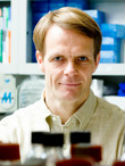Molecular control of dopaminergic differentiation in bFGF expanded midbrain precursors Meeting Abstract
| Authors: | Studer, L.; Lee, S. H.; Panchision, D.; Pickel, J.; McKay, R. D. |
| Abstract Title: | Molecular control of dopaminergic differentiation in bFGF expanded midbrain precursors |
| Meeting Title: | 30th Meeting of the Society for Neuroscience |
| Abstract: | In vitro proliferation of CNS precursors is a promising cell source for brain repair. We recently demonstrated 1 that rat mesencephalic precursor cells can be expanded in vitro with bFGF and converted into functional dopaminergic neurons that, upon transplantation, alleviate behavioral symptoms in Parkinsonian rats. The efficiency of the system has been limited to a 10-100 fold in vitro increase of total cell numbers. Expansion of precursors for longer in vitro periods results in a dramatically reduced dopaminergic yield despite intact neuronal differentiation. We identified several genes that are differentially expressed in precursors expanded for various in vitro periods that correlate with the ability of the cells to generate dopaminergic neurons. Long-term expanded precursors showed decreased expression levels of sonic hedgehog, FGF8 and Nurr1 as well as a loss of Pax2, Pax5 and Pax8 expression by RT-PCR. Re-introduction of some of these differentially expressed genes into long-term expanded precursors partially restored TH differentiation. Our study provides a powerful technique to identify genes involved in the regional commitment of CNS precursor cells and to develop rational strategies for the ex-vivo generation of specific neurons for brain repair. (L. Studer, V. Tabar, R. D. McKay, Nature Neurosci. 1, 290-295 (1998)) |
| Keywords: | meeting abstract |
| Journal Title: | Society for Neuroscience Abstracts |
| Volume: | 26 |
| Issue: | Part 2 |
| Meeting Dates: | 2000 Nov 4-9 |
| Meeting Location: | New Orleans, LA |
| ISSN: | 0190-5295 |
| Publisher: | Society for Neuroscience |
| Date Published: | 2000-01-01 |
| Start Page: | 1344 |
| Language: | English |
| ACCESSION: | BCI:BCI200100093450 |
| PROVIDER: | biosis |
| Notes: | Meeting Abstract: 504.9 -- 30th Annual Meeting of the Society of Neuroscience -- New Orleans, LA, USA -- November 04-09, 2000 -- Society for Neuroscience -- Source: Biosis |
MSK Authors
-
 226
226Studer
Related MSK Work


